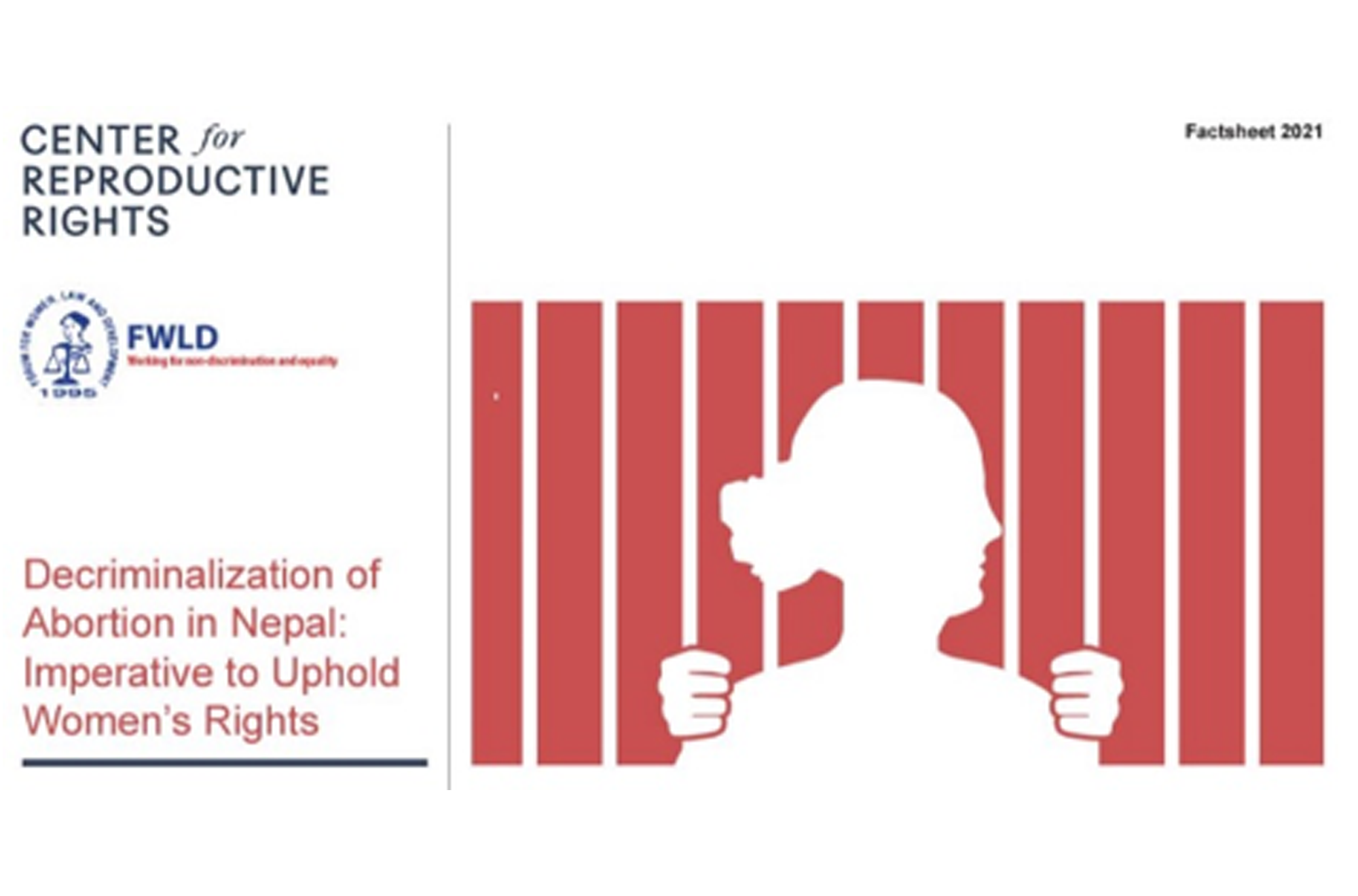
In 2015, the Constitution of Nepal guaranteed safe motherhood and reproductive health rights as women’s fundamental rights, reiterating Nepal’s earlier commitment to women’s reproductive rights. On 18 September 2018, Nepal enacted the Safe Motherhood and Reproductive Health Rights Act, and on 12 October 2020, adopted the Safe Motherhood and Reproductive Health Rights Regulation (SMRHR). The SMRHR Act aims to respect, protect and fulfil safe motherhood and women’s reproductive health rights, and to provide safe, quality, affordable, and accessible maternal and reproductive health services, including safe abortion among others. It also specifically recognises women’s right to access abortion as a right to reproductive health. The Act also allows abortion with the consent of the pregnant woman up to 12 weeks of gestation. It also permits abortion up to 28 weeks of gestation for pregnancies resulting from rape or incest, in situations where the woman suffers from HIV or a similar incurable disease, or when failure to undertake an abortion may pose a threat to the life of the woman, adversely affect her mental or physical health, or cause a fetal impairment. It specifically prohibits forced abortion – i.e. when the procedure is performed without the consent of the pregnant woman or when force, violence, or intimidation are used against her.
Abortion was partially legalised in Nepal in 2002, following advocacy efforts highlighting high maternal mortality from unsafe abortion. A study published in Plos ONE in 2013, covering the years 2002-2010, found that law reform had led to reductions in the most serious complications of unsafe abortion. The study concluded:
“Over the study period, health care use and the population of reproductive aged women increased. Total fertility also declined by nearly half, despite relatively low contraceptive prevalence. Greater numbers of women likely obtained abortions and sought hospital care for complications following legalization, yet we observed a significant decline in the rate of serious abortion morbidity. The liberalization of abortion policy in Nepal has benefited women’s health, and likely contributes to falling maternal mortality in the country. The steepest decline was observed after expansion of the safe abortion program to include midlevel providers, second trimester training, and medication abortion, highlighting the importance of concerted efforts to improve access. Other countries contemplating changes to abortion policy can draw on the evidence and implementation strategies observed in Nepal.”
In 2017, the Center for Reproductive Rights and the Forum for Women, Law & Development in Nepal published a fact-finding study from 16 districts of Nepal called: “Reforms Required in Laws Related to Abortion and Its Enforcement: Facts Revealed from the Review of Case Files.” (written in Nepali) This study found that between 2011 and 2016, 53 abortion-related cases were registered in the district and high courts. Of these cases, 13 were against women for ending their pregnancies, of whom five were convicted and four of the five imprisoned. None of the five women was aware of the legal exceptions in the criminal law and lacked information about facilities where safe abortion services were available, so they went to an unlisted provider. The study also revealed cases where penal provisions were used to prosecute women on the suspicion of illegal abortion without a proper investigation, and even in cases of lawful abortion. Of the other 40 cases, 7 were related to infanticide, 5 were related to forced abortion, and 28 were abortions caused as a result of third-party actions, including by beating.
Neither the 2018 Act nor the 2020 Regulations fully decriminalised abortion. For example, ending a pregnancy after 28 weeks’ gestation to save a woman’s life is denied. This year, Sabin Shrestha, Executive Director of the Forum for Women, Law and Development, Nepal reported in a FIGO webinar that if an abortion takes place outside existing legal conditions or medical abortion pills are obtained from an unlisted provider, the woman can be prosecuted. Moreover, the definition of “abortion” can include accidentally causing a miscarriage and in a few cases, even a miscarriage without having been caused has been treated as suspicious.
Following the January 2021 Universal Periodic Review of Nepal and a number of other states by the UN Human Rights Council, Nepal accepted a recommendation from France to decriminalise abortion and completely protect the rights and sexual and reproductive health of women and girls.
SOURCES: The Week, 7 August 2021 ; PLoS ONE, by JT Henderson, M Puri, M Blum, CC Harper, A Rana, et al. Effects of abortion legalization in Nepal, 2001–2010. 2013;8(5):e64775 ; Decriminalization of Abortion in Nepal: Imperative to Uphold Women’s Rights, by Center for Reproductive Rights, Forum for Women, Law and Development, 2 June 2021.



